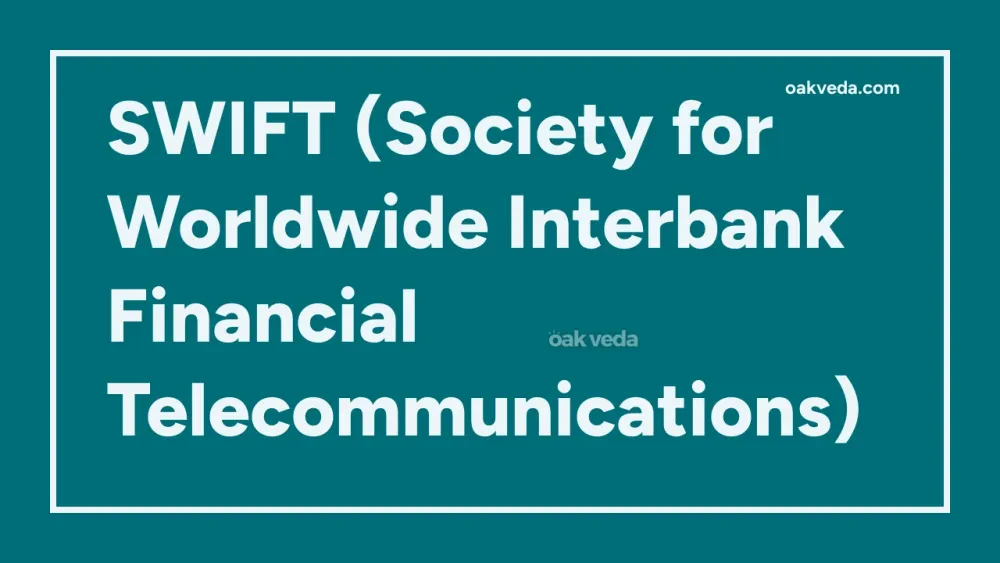
What is the Full Form of SWIFT?
The full form of SWIFT is Society for Worldwide Interbank Financial Telecommunications. This global cooperative plays a crucial role in facilitating secure and efficient financial transactions across borders.
What is Society for Worldwide Interbank Financial Telecommunications?
Society for Worldwide Interbank Financial Telecommunications, commonly known as SWIFT, is a member-owned cooperative that provides a standardized and secure platform for financial institutions to exchange information about transactions. Founded in 1973, SWIFT has become an integral part of the global financial ecosystem, enabling seamless cross-border payments and other financial operations.
Origin and Development of SWIFT
SWIFT was established in response to the growing need for a reliable and efficient method of international financial communication. Before its inception, banks relied on telex for cross-border transactions, which was slow and prone to errors. The founding members, consisting of 239 banks from 15 countries, came together to create a standardized system that would revolutionize global finance.
Since its launch in 1977, SWIFT has continuously evolved to meet the changing needs of the financial industry. It has expanded its services beyond simple messaging to include a wide range of financial products and solutions.
How does SWIFT work?
SWIFT operates by assigning each member institution a unique identifier known as the Bank Identifier Code (BIC) or SWIFT code. This code contains information about the bank's name, country, city, and branch. When a financial institution initiates a transaction, it sends a SWIFT message containing the relevant details to the recipient bank using these codes.
The SWIFT network acts as a secure messenger, ensuring that the information reaches its intended destination quickly and safely. It's important to note that SWIFT does not hold or transfer funds; it merely facilitates the communication necessary for financial institutions to process transactions.
Functions of SWIFT
SWIFT serves several critical functions in the global financial system:
- Secure Messaging: Provides a standardized platform for financial institutions to exchange information securely.
- Transaction Processing: Facilitates various types of financial transactions, including payments, securities, treasury, and trade.
- Compliance Support: Offers tools and services to help financial institutions comply with regulatory requirements.
- Business Intelligence: Provides data and analytics to help institutions make informed decisions.
- Standardization: Promotes the use of standardized financial messaging formats to improve efficiency and reduce errors.
Applications of SWIFT
SWIFT's services are utilized across various sectors of the financial industry:
- Banking: Enables cross-border payments, cash management, and trade finance.
- Securities: Facilitates the processing of securities transactions, including clearing and settlement.
- Treasury: Supports treasury operations for corporate and financial institutions.
- Trade Finance: Enables the exchange of trade-related documents and information.
- Foreign Exchange: Supports the execution and settlement of forex transactions.
Features of SWIFT
Key features of the SWIFT network include:
- Global Reach: Connects over 11,000 institutions across more than 200 countries and territories.
- Security: Employs state-of-the-art encryption and authentication measures to protect financial data.
- Reliability: Maintains high uptime and message delivery rates.
- Standardization: Uses ISO 20022 standards for financial messaging.
- Interoperability: Allows seamless communication between different financial systems and platforms.
Benefits of SWIFT
The SWIFT network offers numerous benefits to its members and the global financial system:
- Increased Efficiency: Streamlines financial operations and reduces processing times.
- Cost Reduction: Lowers operational costs associated with international transactions.
- Risk Mitigation: Enhances security and reduces the risk of fraud and errors.
- Global Connectivity: Provides access to a vast network of financial institutions worldwide.
- Standardization: Promotes the use of common formats and protocols, improving interoperability.
Limitations or Challenges of SWIFT
Despite its widespread adoption, SWIFT faces several challenges:
- Geopolitical Risks: Can be used as a tool for economic sanctions, potentially leading to the exclusion of certain countries or institutions.
- Cybersecurity Threats: As a critical financial infrastructure, SWIFT is a prime target for cyberattacks.
- Competition from Emerging Technologies: Faces competition from blockchain-based solutions and other fintech innovations.
- Regulatory Compliance: Must continuously adapt to evolving regulatory requirements across different jurisdictions.
Future Developments in SWIFT Technology
SWIFT is actively working on several initiatives to enhance its services and maintain its relevance in the rapidly evolving financial landscape:
- SWIFT gpi: Improving cross-border payments with faster processing times and enhanced transparency.
- API Integration: Developing APIs to enable easier integration with various financial systems and applications.
- Blockchain Exploration: Investigating the potential of distributed ledger technology to enhance its services.
- Artificial Intelligence: Leveraging AI and machine learning to improve fraud detection and operational efficiency.
FAQs on SWIFT Full Form
-
Is SWIFT a bank? No, SWIFT is not a bank. It is a cooperative society that provides a secure messaging system for financial institutions.
-
Can individuals use SWIFT? Individuals cannot directly use SWIFT. It is a system used by financial institutions to facilitate transactions on behalf of their customers.
-
How many countries use SWIFT? SWIFT is used in over 200 countries and territories worldwide.
-
Is SWIFT the only system for international money transfers? While SWIFT is the most widely used system, alternatives exist, such as Ripple and blockchain-based solutions.
-
How does SWIFT ensure security? SWIFT employs advanced encryption, authentication protocols, and continuous monitoring to ensure the security of its network.
In conclusion, the Society for Worldwide Interbank Financial Telecommunications (SWIFT) continues to play a vital role in global finance, facilitating secure and efficient cross-border transactions. As the financial landscape evolves, SWIFT's ability to adapt and innovate will be crucial in maintaining its position as a cornerstone of international financial communication.
You may be interested in:

